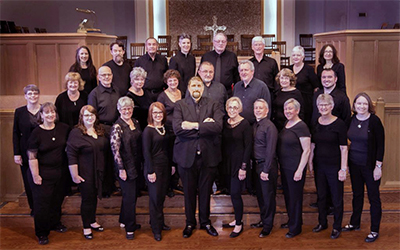by Timothy Robson

Gjeilo has amassed a large following in recent years for his extensive choral output, much of which has been recorded by well-known ensembles, including Voces8 and the Choir of King’s College, Cambridge. His music is tonal and non-threatening, but spiced with enough dissonance to provide interest, and his style is liberally influenced by other composers and genres — John Rutter, Morten Lauridsen, minimalism, and film music. The choral works are often based on liturgical or biblical texts.
The peril of programming a concert of a single composer’s works in a consistent style is that the music all starts to sound the same. Two of the most interesting works on the program were early Gjeilo. The Spheres, for chorus and strings, is a setting of the Kyrie Eleison from his Sunrise Mass, with striking long chords overlapping each other to create the effect of echoes. Serenity is a magnificent setting of the Christmas text “O magnum mysterium” for choir and solo cello. The opening section emphasizes silence as part of its development, before moving onto a more rhapsodic central section. The opening music returns at the end, but with the silences collapsed. Kent Collier was the excellent cellist.

Among Ola Gjeilo’s attractive settings of Christmas texts were the flowing A Spotless Rose — a reasonable alternative to Herbert Howell’s famous version — and Ecce Novum (“Behold a new joy”). Both are worthy additions to the repertoire.
Good Company’s choral sound was mostly well-blended, with generally good intonation, although greater precision in tuning would have been desirable, especially in the unaccompanied works with tight harmonies. There were occasional insecure entrances in key spots. Gjeilo’s music might sound straightforward, but its subtle intricacies make it more difficult to perform than it seems.
At times, the sonorities of the string ensemble plus piano overwhelmed the chorus. In these cases the sopranos and altos especially sounded underpowered. At almost two hours in length, this was a generous program. Fewer works to prepare might have led to greater security in performance, while still providing the audience with a representative sample of Gjeilo’s works.
In his spoken comments, Mike Carney announced that Good Company intends to continue with a “single composer intense weekend” next season, featuring West Coast composer Joan Szymko.
Published on ClevelandClassical.com November 12, 2018.
Click here for a printable copy of this article



